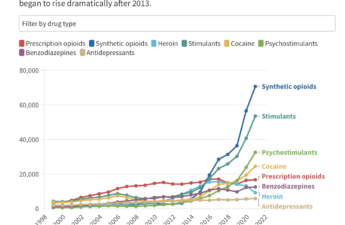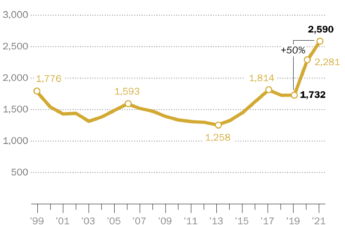Category: Law
Arizona’s now-repealed abortion ban serves as a cautionary tale for reproductive health care across the US
Medical students are less inclined to enter the specialty and more likely to avoid training positions, employment or both in states with restrictive or near-total bans. These states also have difficulty retaining existing OB-GYNs.
Oregon’s Drug Decriminalization Aimed to Make Cops a Gateway to Rehab, Not Jail. State Leaders Failed to Make It Work.
Ballot Measure 110, approved by voters in 2020, created a new role for law enforcement in Oregon. While there’s evidence people living with addiction in the state are increasingly finding their way into treatment, the failure to turn police encounters into successful on-ramps to rehab has been cited by critics as prime evidence the measure isn’t working. Oregon lawmakers, noting an ongoing rise in overdose deaths, are now looking to restore jail time for drug possession.
But Oregon’s political leaders themselves played central roles in failing to deliver on the potential for law enforcement to connect people with lifesaving services under the new measure, documents and interviews with a wide array of people involved in the system indicate.
Act expands access to opioid use disorder treatment
Previously, providers were required to complete training and apply for a waiver from the Drug Enforcement Administration (DEA) to prescribe buprenorphine. Now, those with a current DEA registration that includes Schedule III authority can prescribe it.
Doctors Emerge as Political Force in Battle Over Abortion Laws in Ohio and Elsewhere
Doctors who previously never mixed work with politics are jumping into the abortion debate by lobbying state lawmakers, campaigning, forming political action committees and trying to get reproductive rights protected by state law.
States stiffen penalties for fentanyl, despite public health concerns
Critics argue that harsh penalties could deter those in need of help and worsen societal disparities.
Snooping in Medical Records by Yakima Valley Memorial Hospital Security Guards Leads to $240,000 HIPAA Settlement
The information accessed included names, dates of birth, medical record numbers, addresses, certain notes related to treatment, and insurance information.
Hospitals in Two States Denied an Abortion to a Miscarrying Patient. Investigators Say They Broke Federal Law.
After her water broke too early, Mylissa Farmer was denied abortion care at emergency rooms in Missouri and Kansas. The Biden administration says the hospitals violated federal law.
Gun Deaths Drive Historic Spike in Child Mortality Rates
After decades of steady improvement, the death rate of America’s children and teens shot up between 2019 and 2021 — and COVID-19 wasn’t the reason.
After Nashville Shooting, Democratic States Push for New Gun Restrictions
In Washington state, Democrats are expecting to enact legislation that would ban semi-automatic rifles, add a 10-day waiting period for gun purchases and allow gun manufacturers and sellers to be liable for negligent sales.
Anti-mifepristone court decisions rely on medical misinformation about abortion and questionable legal reasoning
All the risks associated with medical abortion – and therefore the time and resources doctors must spend caring for patients – will be higher if pregnant people are compelled to have surgical abortions or to give birth.
Texas Abortion Ruling Nears, But Blue States Aren’t Waiting to Protect Pill Access
A federal judge in Texas soon could make one of the two pills used in medication abortions harder to come by, even in blue states that support abortion rights. Officials and advocates in those states aren’t waiting for the judge to rule. They’re trying to ensure continued access to the drugs that a growing number of Americans are using to end their pregnancies at home.
Medication abortion could get harder to obtain – or easier: There’s a new wave of post-Dobbs lawsuits on abortion pills
Medication abortion now accounts for more than half of all abortions in the United States, but there are a raft of new legal battles that may expand or limit access.
Supreme Court Case Could Curtail Rights of Medicaid Patients
Twenty-two Republican-leaning states have urged the Supreme Court to block beneficiaries of federal safety net programs from suing. If the court agrees participants in many federal entitlement programs could lose the right to go to court when they believe a state, city or county has violated their rights in the administration of those programs.
Health Harms of Mass Shootings Ripple Across Communities
Research shows that mass shootings lead to higher rates of depression and anxiety and higher risks for suicide among young people. They also lead to an overall decline in a community’s sense of well-being. Some studies suggest that mass shootings damage economic prospects in a community, diminishing productivity and earnings.
Hospital Investigated for Allegedly Denying an Emergency Abortion After Patient’s Water Broke
The case involves a woman whose water broke early in her pregnancy, but the hospital refused to let doctors perform an abortion. She eventually sought medical help outside the state.










